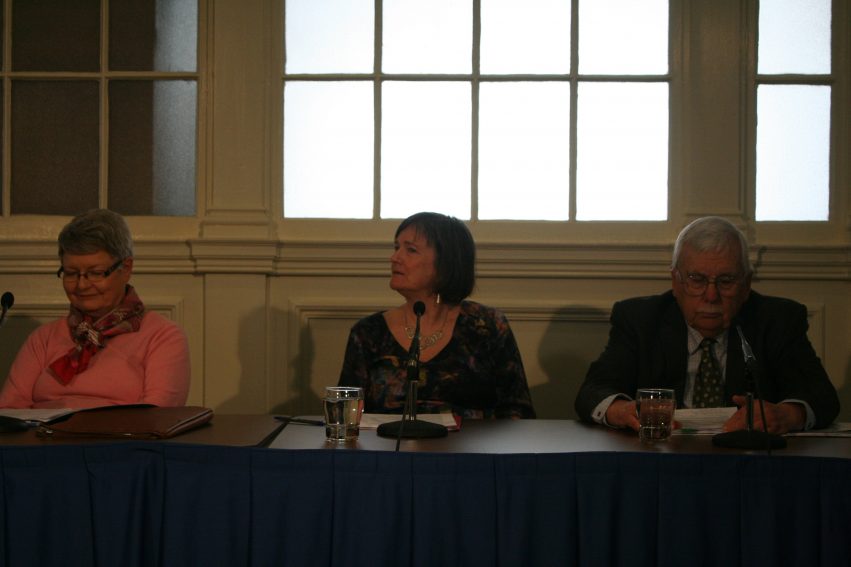KJIPUKTUK (Halifax) – The Department of Community Services says that it is executing a plan to phase out large institutions for people who live with developmental disabilities and to make their care more personalized. But the people who are directly affected aren’t buying it.
That’s what caregivers, family members, workers in the field, and self advocates from everywhere in the province told the Community Homes Action Group (CHAG), a group that advocates for community-based living options.

This morning CHAG made its findings public at a press conference held at Province House.
An online survey conducted late last year shows that most surveyed stakeholders have little confidence in the department’s ability or desire to execute an ambitious transformation project announced in 2013 by the NDP, the party in power at that time.
The current Liberal government endorsed the transformation shortly after winning the election.
The so-called roadmap report promised that large institutions would be phased out, and care and funding would become more tailored to individuals. Community Services also committed to be more open and inclusive in its planning and policy making.
“When the report was released I think it was fair to say people in the disability community were excited,” Lois Miller, a CHAG spokesperson, told the people gathered at the press conference.
“Here were recommendations that people really approved of, that the disability community had been part of implementing an that government had now endorsed. So people were very hopeful,” Miller said.
“There was hope that there was going to be a better future for their sons and daughters with disabilities,” added Jean Coleman, the soon-to-retire director of the Nova Scotia Association of Community Living. “There was an excitement in the air that things were going to change, that it would give their sons and daughters a better life.”
But not for long.
“After one or two years people were beginning to feel that government was talking the talk, but not walking the walk,” said Miller.
The roughly 140 people who responded to the survey certainly were feeling that way.
67% thought that Nova Scotia’s commitment to providing person-directed planning was poor. 76% called the government’s progress on making community homes more available poor. The government’s progress on closing institutions fared no better, with a 72% poor-rating.
75% believes the government is doing a poor job increasing employment opportunities for persons with developmental disabilities. Survey results for wait lists for services (at 75%) and housing (86% poor) were equally dismal.
If there is any silver lining, it is that an earlier survey held in 2015 was even more discouraging.
People also submitted often heart wrenching comments, serving as an acute reminder that we are not dealing with dry statistics but with real lives of parents and children.
“Our son is an only child living with aging parents and with no extended family in Nova Scotia. What will happen when we die? He need-deserves Autism-appropriate housing and he deserves to have it before we die so that we can help with the transition,” writes one parent who has been on a waiting list for three years now and has no real hope of ever reaching the top because prioritization is crisis-driven.
“Aging parents continue to be extremely anxious about their loved ones, they realize that to be able to live in a small option home, for example, is a distant dream,” said Coleman.
“We ask the provincial government to commit to person-directed planning and supports, create community based living options, close institutions, increase employment and reduce wait list,” said Miller, pointing to the province’s obligation to honour the United Nations Convention on the Rights of Persons with Disabilities.
One other thing that the roadmap document promised was that the department would work closely with stakeholders as it moved forward in its implementation.
That kind of democratic approach never materialized, said Miller.
“The advisory committee that brought us the roadmap document was disbanded. A second committee was put in place, but from what I have heard from those involved it really was not very effective. It was more a matter of being preached at rather than getting information,” Miller said.
CHAG requests that you contact Joanne Bernard, Minister of Community Services, if you have any comments on the situation described in their survey. Phone: 1-877-424-1177. Fax: (902) 424-3287. DCSMIN@novascotia.ca
See also: Community Services roadmap hits speedbump, and Community Services commitment to disabilities roadmap wavers (for the Halifax Media Coop)
If you can, please support the Nova Scotia Advocate so that it can continue to cover issues such as poverty, racism, exclusion, workers’ rights and the environment in Nova Scotia. A pay wall is not an option, since it would exclude many readers who don’t have any disposable income at all. We rely entirely on one-time donations and a group of 25 or so dedicated monthly sustainers.



